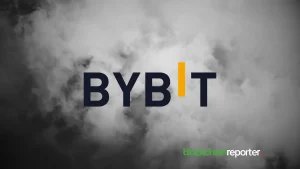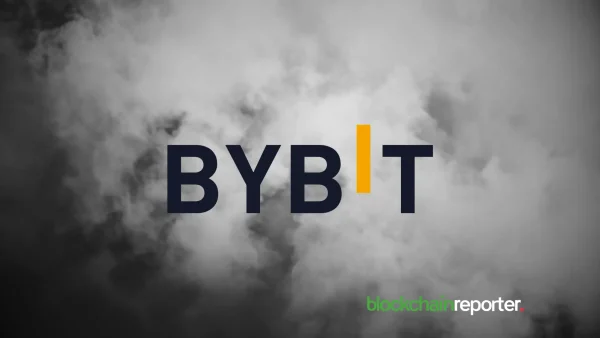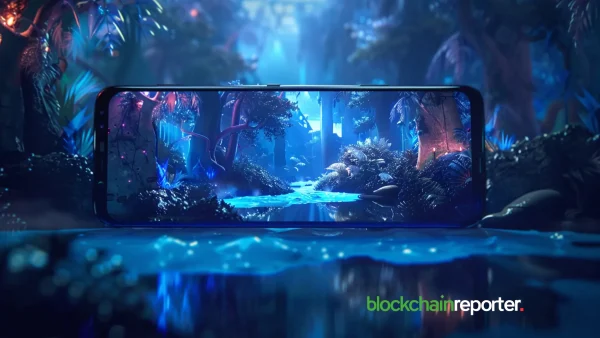
Ankr has emerged as a leading hub for Web3 developers, offering a comprehensive suite of tools and services to build robust applications and establish high-performance connections across more than 30 blockchains. With their multi-chain dApp development tools, AppChain infrastructure services, crypto staking solutions, and globally distributed node infrastructure, Ankr provides developers with an all-in-one solution.
Ankr’s user-friendly solutions break down barriers, allowing anyone to easily build and participate in the Web3 ecosystem. By democratizing access to Web3 technology, Ankr is fostering a more decentralized and user-owned web experience. Their commitment to empowering developers and promoting participation in the crypto economy is paving the way for a more inclusive and decentralized future on the internet.
In this exclusive interview with BlockchainReporter, Kev Silk, Product Lead at Ankr in charge of leading the development of AppChains and tokenomics of the ANKR token, sheds light on the concept of AppChains and their role in empowering clients and driving the widespread adoption of Web3. AppChains, developed by Ankr, offer dedicated and customized blockchain infrastructures that address the scalability challenges of public blockchains.

With Ankr’s support, innovation in Web3 is thriving, driving us closer to a truly decentralized and democratic digital landscape. By providing tailored solutions, Ankr enables developers to overcome key obstacles and unlock the full potential of blockchain technology. Let’s explore the insights shared by Kev Silk and delve into how Ankr’s AppChains simplify the blockchain development process, support project teams, and leverage emerging trends to accelerate the adoption of decentralized infrastructure.
Q1: Could you provide some additional insights into the concept of AppChains and how they empower your clients and contribute to the adoption of Web3?
An application-specific blockchain is exactly what it sounds like, one application or business on one blockchain. Over the last ten years, network congestion and exorbitant gas fees have posed significant challenges in blockchain technology. Applications on layer-1 blockchains like Ethereum and layer-2 chains like Polygon all share the same development space, mempool, and computing resources.
As you can imagine, thousands of transactions from each application can lead to network congestion and sky-high gas fees. However, the AppChains solutions offer dedicated sidechains on networks like Polygon, BNB Chain, and Avalanche for Web3 applications to build, grow, and scale.
The primary advantage of AppChains lies in their ability to address the scalability issues of public L1 and L2 chains. AppChains improve the UX of dApps by enabling blazing-fast transactions and consistently affordable gas fees, but their impact goes beyond scalability. Unlike the conventional approach of a shared, generic blockchain, AppChains introduce a paradigm shift in infrastructure. Instead of molding applications to fit existing blockchains, developers can create customized blockchain infrastructure for their specific applications.
The ability to customize the infrastructure empowers developers to tailor consensus mechanisms, programming languages, throughput, and various other aspects to match their applications’ unique needs precisely. As a result, AppChains pave the way for highly specialized blockchains that amplify the performance and user experience of Web3 applications.
By showcasing the distinctive advantages of blockchain and digital assets, these optimized user experiences enable developers to onboard non-crypto-experienced users and achieve unprecedented success and adoption. In essence, AppChains unlock the potential for Web3 applications to thrive by providing dedicated and customized blockchain infrastructures, ultimately driving the widespread adoption of blockchain technology.
Q2: As a product manager at Ankr, you lead the development of Ankr’s AppChain Infrastructure. What are some key challenges developers face, and how can AppChains solve them?
Blockchain developers encounter significant challenges when building on public L1/L2 blockchains. Fortunately, AppChains offer compelling solutions to address these hurdles, empowering developers and paving the way for innovation and scalability.
One of the primary challenges developers face is scalability. Public blockchains typically operate with a shared mempool (A mempool is where all consumer transactions are sent within a blockchain network to be verified). As a result, developers have to share that building space, leading to congestion as the number of users and applications increases. This congestion results in slower transaction processing times and higher fees, posing obstacles for applications needing substantial user activity.
AppChains provide a remedy to this issue by offering individual blockchains with dedicated mempools. By isolating transactions within their own AppChains, developers can build scalable and independent dApps capable of accommodating large user bases and high transaction volumes. A dedicated blockchain network for developers ensures improved throughput, reduced congestion, and better performance, enabling high-quality UX’s.
Another challenge revolves around the limited customizability of infrastructure on public blockchains. Public L-1 chains have predetermined consensus mechanisms (such as generic Proof-of-Stake (PoS), programming languages, and rules that restrict developers’ options for customization. This lack of flexibility hinders their ability to build blockchain applications that align with their unique requirements.
AppChains introduce a paradigm shift by customizing every aspect of the new blockchain’s infrastructure. Developers can customize every aspect of their blockchain infrastructure, from full nodes, validators, block explorers, gaming SDKs, bridges, and advanced APIs. This level of customizability allows developers to craft tailored infrastructures that perfectly suit their applications’ needs, unlocking new possibilities and driving innovation in the blockchain space.
Furthermore, the lack of customizability and scalability challenges stifle innovation in blockchain development. Developers often harbor creative ideas for alternative consensus algorithms, novel approaches, and specialized features that are not feasible within the confines of public blockchains. The inability to explore and implement these innovative ideas hampers the progress of blockchain technology, limiting its potential impact across various industries and use cases.
AppChains provide a solution by fostering an environment that nurtures innovation. By providing developers with the ability to build with custom high-performance infrastructure, AppChains empower them to explore and implement their imaginative concepts. This freedom to innovate unleashes the full potential of blockchain technology across industries and use cases, opening doors to groundbreaking applications and transformative solutions.
Q3: Ankr aims to enhance the developer-building experience for Web3 applications. Could you elaborate on the specific tools and features Ankr offers developers, and how they simplify the blockchain development process?
Ankr offers many tools and features that greatly enhance the developer-building experience for Web3 applications. These offerings simplify the blockchain development process and empower developers to create robust and scalable solutions.
At the core of Ankr’s offerings is the ability to create AppChains, allowing developers to establish their dedicated blockchains as sidechains within established ecosystems like Polygon, BNB Application Sidechains, or Avalanche. This integration provides developers with a highly scalable environment, enabling seamless interaction with these networks while maintaining the flexibility to tailor their applications’ needs.
Ankr AppChains include essential components such as RPCs (Remote Procedure Calls) or “full nodes.” These nodes store the complete history of blockchain data and serve as interfaces for external applications to interact with the blockchain. Ankr ensures the RPC infrastructure’s reliability, security, and robustness, granting developers easy access to RPC APIs for efficient and streamlined development.
Furthermore, Ankr offers a customizable block explorer, a critical tool for users to explore and track transactions and blocks on the blockchain. With AppChains, developers can personalize the block explorer, incorporating unique features and branding, enhancing the overall user experience.
For Web3 gaming use cases, Ankr provides a powerful Gaming SDK. This comprehensive toolkit equips games built with Unity or Unreal engines with full Web3 wallet, crypto, and blockchain capabilities. The SDK simplifies the migration of mobile and traditional video games to the Web3 ecosystem, unlocking new possibilities for immersive and interactive gaming experiences.
Ankr’s Advanced APIs further enrich the developer experience. These purpose-built blockchain APIs leverage pre-indexed data, enabling faster interactions with the blockchain. Specifically designed for applications like virtual worlds, games, galleries, and marketplaces, these APIs enhance the user experience by ensuring smoother and more responsive interactions.
Ankr includes a bridging solution that allows easy cross-chain transactions with external networks such as Ethereum or Polygon to enhance interoperability. This feature increases the flexibility and accessibility of AppChains, enabling seamless integration with other blockchain ecosystems.
Moreover, Ankr provides a staking interface and liquid staking capabilities. Liquid staking allows native token stakers to receive reward-bearing tokens on other DeFi platforms for earning strategies like yield farming and vaults. Liquid staking opens up new opportunities for token holders to maximize rewards and engage in diverse DeFi activities.
Q4: Ankr is an approved infrastructure partner for developing application-specific blockchains on various ecosystems. Could you share some notable use cases where Ankr has successfully supported project teams in creating customized blockchain solutions?
Ankr has established itself as a trusted infrastructure partner, empowering project teams to create customized blockchain solutions across various ecosystems. We have significantly impacted the growth of two projects: the Chiliz Network and Meta Apes.
The Chiliz Network, known as the largest ecosystem bridging sports and Web3, turned to Ankr for their custom infrastructure needs. Ankr built custom and individual blockchain infrastructure and features tailored to the specific needs of the Chilliz network. With Ankr’s comprehensive infrastructure, the Chiliz Chain gained the scalability, reliability, and performance necessary to provide a seamless Web3 experience to sports fans globally. The infrastructure Ankr developed contributes to the success of the Chiliz ecosystem, empowering developers to leverage blockchain technology in the world of sports.
Ankr’s support extends to diverse projects, including Web3 gaming. A notable success story is Meta Apes, the first Web3 game built on BNB SideChains (SideChains are the AppChain ecosystems of the BNB Chain). Meta Apes wanted to make the vertical jump to web3 but needed help transitioning their existing web2 mobile game to blockchain technology.
Meta Apes utilized Ankr’s AppChain infrastructure and Gaming SDK to transform their existing mobile game into a full-fledged Web3 experience. We created the customized infrastructure of a dedicated BNB Sidechain from scratch and continue to provide engineering support for the Meta Apoes team.
With Ankr’s support, Meta Apes seamlessly integrated Web3, NFT, and crypto capabilities into their game, providing players with an immersive and interactive gaming experience. As a result, Ankr enabled Meta Apes to bring their game to market within six weeks. Since its launch, Meta Apes has garnered immense popularity, emerging as one of Asia’s most downloaded Web3 games.
Developers seeking to create groundbreaking projects can rely on Ankr’s proven expertise and robust infrastructure to unlock the full potential of their Web3 applications. With Ankr as their trusted infrastructure partner, developers can confidently navigate the challenges of building customized blockchain solutions and propel their projects to new heights of success.
Q5: In your experience and research, what are some of the latest trends and developments in Web3 that have the potential to drive mass adoption? How is Ankr leveraging these trends to empower developers and accelerate the adoption of decentralized infrastructure?
Zero-knowledge proofs (ZK proofs) are a transformative trend in Web3, revolutionizing applications’ privacy, security, and trust. Ankr recognizes its potential to drive mass adoption and actively leverages this trend to empower developers and accelerate the adoption of decentralized infrastructure.
By enabling one party to prove the validity of a statement without revealing sensitive information, ZK proofs enhance privacy and instill trust in Web3 applications. They allow users to conduct transactions, interact, and verify identities while preserving the confidentiality of underlying data. This type of enhanced privacy addresses growing concerns over data breaches and privacy violations, fostering wider adoption of Web3 applications.
In addition, ZK proofs contribute to scalability in blockchain networks. Reducing the amount of data processed and stored on the blockchain enhances transaction throughput and efficiency. This scalability improvement enables blockchain networks to handle increased transaction volumes and accommodate a more extensive user base. Scalability is vital for mass adoption, and zero-knowledge proofs offer a promising solution.
Ankr supports the integration of zero-knowledge networks, such as Polygon’s zkEVM solution, by providing essential infrastructure support. We build the foundational RPC connections developers require to build applications on these new zero-knowledge protocols.
Furthermore, Ankr is exploring using ZK proofs to create AppChains on Ethereum. AppChains on Ethereum is the most sought-after developer experience for building new applications – this would be the gold standard for decentralization, security, and scalability. Unfortunately, I cannot publicly describe this initiative in more detail. Yet, this will eliminate barriers to entry for enterprises that will soon not only hold ETH in their treasuries but build on top of Ethereum. We’ll be sharing more on this project in the coming months!
Q6: Ankr’s infrastructure supports over 30 blockchains. How do you prioritize which blockchains to integrate with, and what factors do you consider when evaluating the potential of a new blockchain project?
At Ankr, we prioritize the integration of blockchains based on several key factors that help us evaluate their potential and align with our mission of providing decentralized infrastructure. When considering a new blockchain project, we assess the following factors:
- Market Demand: We evaluate the market demand for a particular blockchain, which includes analyzing its user base, developer community, and adoption rates. We prioritize blockchains with a strong and growing ecosystem, as they are more likely to attract developers and users to our platform.
- Technical Innovation: We consider a blockchain project’s technological innovation and uniqueness. We look for projects introducing novel concepts, improved consensus algorithms, or advanced scalability solutions. Innovative blockchains are crucial in driving the evolution of Web3, and we seek to support projects that push the boundaries of what is possible.
- Developer Engagement: The developer community is a critical factor in the success of a blockchain. We evaluate the level of developer engagement, the availability of development tools and resources, and the community’s vibrancy. A strong and active developer community indicates the potential for robust application development and ecosystem growth.
- Scalability and Performance: Scalability is a significant consideration for blockchain integration. We assess the scalability solutions a blockchain project implements and evaluate its ability to handle a high volume of transactions without sacrificing performance. Blockchains with scalable architectures and efficient consensus mechanisms are prioritized for integration.
- Security and Reliability: Security is paramount in the blockchain industry. We thoroughly analyze a blockchain project’s security protocols, code audits, and track records. We prioritize blockchains with a strong emphasis on security, as they ensure the integrity of applications built on our infrastructure.
- Long-Term Viability: We evaluate the long-term viability of a blockchain project, considering factors such as governance mechanisms, funding, and partnerships. A sustainable and well-governed project is more likely to provide stability and continuity for developers and users.
Interview Summary
Ankr is playing a crucial role in enabling scalability and innovation for Web3 adoption. Through their comprehensive suite of tools and services, including AppChains, Ankr is empowering developers to build robust applications and establish high-performance connections across multiple blockchains. Their user-friendly solutions break down barriers and democratize access to Web3 technology, fostering a more inclusive and decentralized web experience.
As explained by Kev Silk, the concept of AppChains is at the core of Ankr’s offerings, addressing scalability challenges and providing dedicated and customized blockchain infrastructures. By allowing developers to tailor every aspect of their blockchain infrastructure, AppChains unlock the potential for highly specialized blockchains that amplify performance and user experience. This customization paves the way for innovative ideas and groundbreaking applications in the blockchain space.
Ankr simplifies the blockchain development process through various tools and features, such as RPCs, customizable block explorers, gaming SDKs, advanced APIs, and bridging solutions for cross-chain transactions. They also offer staking interfaces and liquid staking capabilities, opening up new opportunities for token holders to maximize rewards and engage in diverse DeFi activities.
When evaluating potential blockchain projects to integrate with, Ankr considers factors such as market demand, technical innovation, developer engagement, scalability and performance, security and reliability, and long-term viability. Overall, Ankr’s commitment to empowering developers, fostering innovation, and accelerating the adoption of decentralized infrastructure positions them as a leading player in the Web3 ecosystem.









